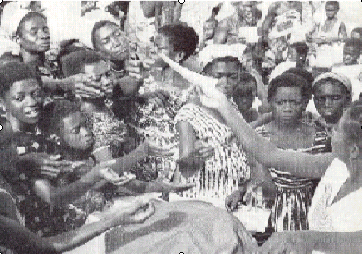| CHAPTER II - HEALTH SERVICES | <<Back |
| 147 | ||
| AU | : | Sheela Rangan & Sushma J |
| TI | : | Non governmental organisations in tuberculosis control in Western India. |
| SO | : | FRCH, Bombay, 1995 |
| DT | : | M |
| AB | : |
A study of NGOs was undertaken in Maharashtra and Gujarat to assess the extent and the type of NGOs’ contribution to TB control and to determine ways to strengthen it. The analyses of responses to a mailed questionnaire by 77 NGOs in Maharashtra and 57 from Gujarat and, in-depth case studies of 13 NGOs, selected purposely to understand their functioning and to evaluate the effectiveness of their approaches to control TB, are presented. Regarding the nature of anti-TB work by NGOs, about 50% were dependent on public health services for one or more of their programme components and, about 40% had activities comprising case-finding, treatment and case-holding. Variations in NGOs contribution between the two states were marked. One-third of all cases detected and started on treatment by the Gujarat State TB Programme were reported by NGOs, while in Maharashtra, case-detection by NGOs was an insignificant 3.5%. More organizations and better facilities were available in Gujarat. The NGO approaches for offering anti-TB services fell into four categories: 1) Institution, Hospital or Clinic-Based programmes, 2) Use of Community-based workers, 3) Use of Public Health Services and, 4) Involving Private Doctors. Concerning technical aspects, all NGOs depended on X-ray as a diagnostic tool and most NGOs used SCC for all their patients. The weakest aspect of most NGO programmes was non-maintenance of records and failure to use proper records to assess or improve programme implementation. To improve treatment adherence by patients, NGOs used various approaches such as using part-time village-based functionaries of another health care programme and home delivery of drugs. For the NGOs, individual donations formed the most important source of funding. Ways by which NGOs and governmental agencies could support each other are suggested. |
| KEYWORDS: VOLUNTARY ORGANIZATION; NGO; INDIA. | ||
 Community Health education by Volunteers |
||